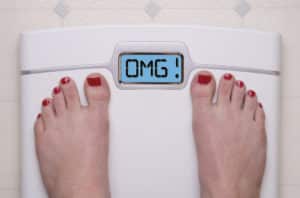
Recent studies have shown that light to moderate drinking is not associated with severe weight gain. However, heavy alcohol consumption is positively and consistently correlated with added weight, which can eventually lead to obesity. Alcohol intake may produce higher body fat percentage in older adults and adolescents. The connection between body weight and alcohol intake is typically stronger in men than women, due to the type of alcohol and amount consumed by men.
Alcohol and Calories
Why is there is such a high correlation in heavy alcohol consumption and weight gain? First, the body is not able to store alcohol, which causes the body to metabolize it immediately. The alcohol becomes the priority of the metabolic process, causing a loss of efficiency in metabolizing other fats and sugars. In turn, normal metabolism actually slows down overtime.
Second, alcohol is high in calories. These calories are typically referred to as “empty calories” with little to no nutritional value. Alcohol has seven calories per gram, which is roughly equivalent to the calories in one gram of pure fat. By comparison, carbohydrates and protein only have four calories per gram. Among popular alcoholic beverages, here are some calorie counts:
- A Pina colada has about 500 calories
- A glass of wine has about 100 calories
- A pint of beer has about 150 calories
- Distilled alcohol (whiskey, vodka, gin, rum) has about 100 calories per 1.5 ounces
On top of the empty calories consumed, drinking often increase one’s appetite. Mindless, poor food choices are often made while drinking and may result in overeating.
Avoiding Weight Gain
Abstinence from alcohol is never a bad idea. But, if you continue to drink alcoholic beverages and want to limit weight gain drink in moderation. For practical purposes, moderation means one “standard” drink a day. A standard drink is 5 ounces of wine, 12 ounces of beer and 1.5 ounces of liquor. Other helpful tips include eating a healthy meal before going out, drinking water between alcoholic beverages, and preparing healthy snacks before going out.
Seek professional help if:
- Your drinking is causing problems at work, home, or school
- You or someone you love is concerned about your alcohol intake and consumption
- You cannot control your drinking
The Council on Recovery is often the starting place for people seeking outpatient rehab and counseling, as well as help for family members. Call 713.942.4100 or visit www.councilonrecovery.org
http://lifehacker.com/this-infographic-shows-how-alcohol-contributes-to-weigh-1654922869
https://medlineplus.gov/ency/patientinstructions/000889.htm
https://www.ncbi.nlm.nih.gov/pmc/articles/PMC4338356/
